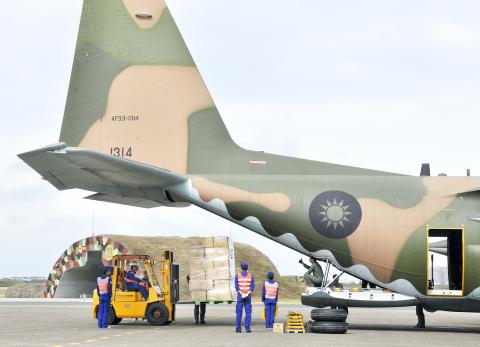|
Planes fly relief
supplies to Philippines
HELPING HAND: The two C-130 planes each carried
7.5 tonnes of goods that had been collected by various Buddhist groups and the
Red Cross Society of the ROC
By Rich Chang / Staff reporter

Military personnel load relief
supplies bound for the Philippines into a C-130 military cargo plane at the
Hsinchu Air Force Base in Hsinchu yesterday morning.
Photo: Reuters
Two Republic of China (ROC) Air Force
C-130 transport aircraft laden with relief supplies flew to the Philippines
yesterday.
One plane left at 1:15pm from Hsinchu Air Force Base, and the second left eight
minutes later, each carrying 7.5 tonnes of relief goods, including instant
noodles, dry food, military blankets and other items.
The air force said the two planes would fly directly to Cebu City in the central
Philippines, a journey of about three hours, and would return immediately after
unloading.
The Ministry of Foreign Affairs said about 100 tonnes of goods had been
collected so far for survivors of Typhoon Haiyan and that more missions were
expected.
Ministry of National Defenese spokesman Major General David Lo (ù²Ð©M) told a
press conference that 20 crew members and one Ministry of Foreign Affairs
official were taking part in the mission.
He said whether more flights would be scheduled depended on weather conditions
and the amount of relief supplies collected.
The relief aid was donated mainly by Buddhist organizations, including the
Buddhist Compassion Relief Tzu Chi Foundation, Fo Guang Shan, Ling Jiou Mountain
and Dharma Drum Mountain, as well as the Red Cross Society of the ROC.
The air force said the C-130s have taken part in other international relief
missions, including the South Asia tsunami in 2010 and Haitian earthquake in
2004.
Taiwan¡¦s representative office in the Philippines said the government had
originally wanted to send the supplies directly to the typhoon-ravaged city of
Tacloban, but it accepted the suggestion of Manila officials to send the planes
to Cebu City.
The Philippine government has said the airport in Tacloban was seriously damaged
in the typhoon, and looting in the area and a curfew imposed on the city has
made it a less than ideal place to send supplies.
The foreign ministry said on Sunday that Taiwan has extended its sympathy to the
Philippines over the devastation caused by Haiyan and had donated US$200,000
toward relief efforts.
However, local media have reported that some people have been opposed to
providing relief aid because of the May 9 shooting incident that killed
Taiwanese fisherman Hung Shih-cheng (¬x¥Û¦¨). The incident triggered a diplomatic
standoff that lasted until early August.
In response to media queries yesterday, Hung¡¦s daughter Hung Tzu-chien (¬x·Oãf)
said: ¡§The government [of the Philippines] might have no humanity, but the
people are innocent.¡¨
¡§Based on humanity, I definitely support the relief missions,¡¨ she said.
She said the shooting of her father was an inhumane act by Philippines Coast
Guard personnel, but it had nothing to do with helping survivors of such a
disaster.
Meanwhile, the Tzu Chi Foundation said it has set up a disaster response center
to deliver supplies and provide relief to the areas devastated by Haiyan.
The Hualien-based foundation said it had collected 30,000 blankets and 200,000
packets of instant rice meals so far, and that all of the blankets and 60,000
packets of instant rice packets had been sent on the two air force planes that
left yesterday.
More relief supplies are being sent to Taipei by train and truck for shipment to
the Philippines.
A medical and disaster relief team consisting of 40 Tzu Chi volunteer workers in
the Philippines, including 10 medical experts, will head to the typhoon-stricken
areas today to directly assist victims, a foundation spokesman said.
Haiyan, which struck on Friday last week, was one of the most powerful storms to
ever hit land and death toll estimates have ranged up to 10,000 people, though
the lack of contact with many of the devastated areas has made it difficult for
Philippine authorities to get an accurate count of the casualities and the
damage.
Additional reporting by CNA
|
![]()
![]()
![]()